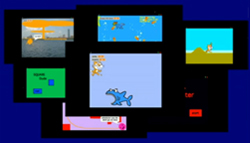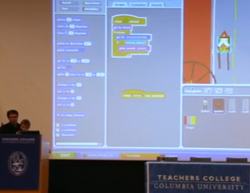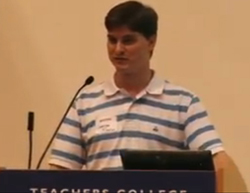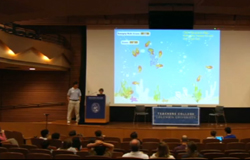Learning from Scratch
Learning from Scratch
TC hosts a day devoted to creating educational video games
Scratch is an educational programming technology developed by MIT's Media Lab. It's also become, in techie parlance, a verb meaning "to design video games"--and it's also now the term for a growing trend in classroom learning of valuable mathematical, computational and reasoning skills.
MIT held the world's inaugural Scratch Day in 2008, and the following year, Teachers College hosted its own Scratch Day event. This year, TC, along with
On that sunny Saturday morning, the third floor of Macy was lit up by the sounds of excited, youthful voices. In a computer lab on the third floor, local public school students were gathered in clusters around computers in the Game Design Jam Room.
One of the larger Scratch Day events around the globe, TC's event attracted approximately 100 gamers, academics, parents and children from around the metro area. An official from the New York State Department of Education even traveled from
The event was a joint effort between ILT, TC's Office of School and Community Partnerships, and two academic departments--Math, Science and Technology, and Human Development.
"The purpose of Scratch Day is to give neighbors, especially K-12 students, a chance to spend a day learning about technology, at no cost to them," explained event organizer Cameron Fadjo, a first-year doctoral student in Cognitive Studies.
New-media technology pioneer Idit Harel Caperton, President and Founder of the World Wide Workshop Foundation, delivered the day's keynote address in the
Showing videotaped interviews, Caperton highlighted the experience of Sarah, a high school student who'd used the technology to create "Don't Be Mean, Go Green," a game that promotes eco-awareness. In Sarah's game, a player who chooses a car as a mode of transportation, instead of a bike or a bus, automatically loses.
For Capteron, learning technologies have far-reaching and as-yet-untapped potential.
"The results we've achieved in the last three years has really shown how failing schools students and educators can be transformed, bringing a lot of life and creativity into the community," said Capteron. "It's not easy to implement, but it's definitely worth it."
The Scratch Day lineup also featured the work of TC and
Between the diverse offerings, educators and students alike left the event with much to think about. After Scratch Day, Fadjo received enthusiastic responses from parents, including the following excerpt from an email:
It is heartening to see enthusiastic adults step up to mentor the next generation and openly share knowledge and time with the community.
To view more on Scratch Day, visit: www.tc.edu/news/7583.
Published Thursday, Jul. 1, 2010




